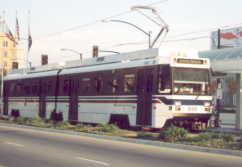
Light Rail Now and Walkable Neighborhoods (LRN) can be contacted at: Light Rail Now! |
Weyrich: How rail can prevail Introduction by Light Rail Progress Conservative ikon Paul Weyrich is not only a vigorous supporter of mass transit – particularly rail transit, including light rail – he's a seasoned political strategist with lots of savvy. Whether you agree with his overall political philosophy or not, when he gives political strategy advice, it's worth listening to. Weyrich underscores that rail transit proponents must "get their act together" – intimating that they must be prepared to respond to the anti-transit "think tank" monographs which zealous light rail opponents crank out in abundance. in particular, he advises, rail supporters must be prepared to "answer the charges of Libertarian opponents" and get the real facts about light rail before the public. That's certainly one of the roles that Light Rail Progress, and this website, try to fulfill. Weyrich also makes a strong case for identifying receptive voters and making an effort to get a strong turnout. in addition, he makes a pitch for seeking "electoral support among conservative middle class voters", who, he points out, may often be receptive to the attractions of rail transit. Railway Age June 2000 Can rail prevail the first time around? By Paul M. Weyrich President, Free Congress Research and Education Foundation At long last, after four failed attempts, voters in Phoenix voted to approve a light rail system. And voters in the Denver area, after several failed attempts, approved a significant expansion of their LRT last November. It took years and years and an extraordinary effort to win voter approval for rail in Phoenix and Denver. Indeed, the vast majority of first-time attempts fail. Why? He who frames the issues determines the outcome of the debate. Rail proponents have been notoriously deficient in seizing the moral high ground in presenting their case to voters. Instead, they permit their opponents to condemn rail. They say little until the voter has already made up his mind.
These are but a few of the charges. They can easily be answered. In Dallas, for example, 85% of the electorate supports LRT. The argument in Dallas is no longer whether to build it, but how fast can it be built to other communities in the Metroplex. Surveys show that often more than half the riders of new systems have left their cars at home. Many are first time transit riders, and in every case the bus systems have grown significantly because of LRT. The economic development LRT has spurred nearly everywhere is significant. Opponents can be blown away if they are tackled in time. Yet if they go unchallenged, voters will believe even crazy arguments. In a referendum, you don't have to prove you are right. All you have to do is to cause doubt in the minds of the voter. Unanswered charges, no matter how absurd, cause doubt. Such was the case just a few weeks ago in San Antonio. The Texas Public Policy institute, along with radio talk show hosts, advanced every argument imaginable against light rail. Proponents failed to answer them adequately before they took hold in the minds of the voters. The result was a 70% to 30% drubbing of rail despite polling numbers indicating significant support. The arguments against rail come mainly from Libertarians, who are a very small component of the electorate. Often, the monographs put out by the think tanks in the cities where LRT is an issue are simply copies of studies done in other cities with just the names and numbers changed. But most of the time, rail proponents do not have their act together, and by the time they get it together it is too late.
Most transit proponents run elections without a voter ID and turnout system. Oftentimes, transit referenda are run at a special election. Turnout is low (even if transit is on the ballot in a regular election, turnout is often well below 50% of registered voters). Opponents of transit, especially if a tax increase is involved, are highly motivated to vote. They may be a minority, but they will get to the polls. Most conservative campaigns do identify their vote and turn it out. Rail transit proponents are usually not as highly motivated. They will vote for transit if you get them to the polls. Left to chance, they won't vote. Several elections in 1999 were lost by just a few percentage points. Had there been a good voter ID program in place, transit would have prevailed. Rail transit will be on the ballot in more and more places as traffic congestion becomes a greater problem. Rail advocates had better learn to frame the issues in their favor, talk to middle class conservatives, and know where their voters are come election day. Then, and only then, will rail prevail the first time around. Rev. 00/09/05 Light rail can help shape Austin's future growth! Support light rail for Austin! |
|
|
|